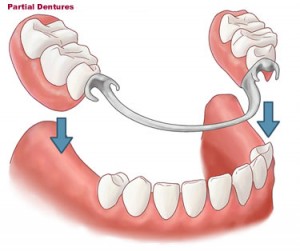

So you have a missing tooth you want to replace and you want to know what your options are? Well, you are in the right place as we have written this blog post specifically for you. If you have a missing tooth you principally have four options:
Let’s look at each of these in turn to see which of them could be right for you.
Apart from the obvious cosmetic disadvantages to leaving a gap there are also some health disadvantages. Did you know that your teeth are in a fine balance keeping them in exactly the right position? Teeth are prevented from over erupting and drifting backwards and forwards due to the pressure applied to them by the adjacent and opposing teeth. When a tooth is missing from one jaw, a tooth on the opposing jaw then misses out on that opposing force every time you bite. What can happen is that the opposing tooth can over erupt and drift down, or up, into the gap.
Teeth either side of the space can also drift into the gap. This can make replacing missing tooth far more difficult in future and also creates bite problems which could lead to jaw joint issues and headaches in the future.
Dentures have been around for centuries and are a common way to replace missing teeth. They can usually be made to look highly aesthetic so that nobody else would know that you are wearing one. One of the problems with dentures is that there are often clips, known as clasps which fit around your adjacent teeth to hold the denture in place. These clasps are often made of metal and are therefore less aesthetic and can be a little unsightly.
If you are wearing dentures then you need to ensure that you continue to visit your dentist regularly. The shape of your denture fits your gum exactly, but your gum will change shape over time as you naturally age. Your denture won’t! This change in shape of your gum means that the denture has more pressure put on it, and if your denture is made of plastic, which most are, it can be likely to fracture. Visiting your dentist regularly means he or she can check the fit of your denture and suggest a reline if appropriate.
One of the biggest advantages of dentures is the cost, they tend to be the cheapest way to replace missing teeth.
A dental bridge is also a common way to replace missing teeth and has been used widely in dentistry for many years now. Dental bridges can be highly aesthetic and look amazing when they are fitted, they also come with a few disadvantages though.
A dental bridge requires the preparation of the teeth either side of the missing one. The diagram shows how the adjacent teeth need to be trimmed down into his stumps to accept the support for the new tooth. If the adjacent teeth to the missing one are otherwise healthy this seems a shame to destroy healthy teeth!
Another potential problem with a dental bridge is that the gum area where the tooth has been removed will change shape over time. This is because the natural bone moves as we get older, as it moves the gum shrinks with it.
This could mean that the dental bridge does not meet the gum quite so nicely as time goes on, this could result in you needing to replace your dental bridge with a new one.
The final option in our list for replacing missing teeth is to consider a dental implant. Anatomically a dental implant is designed to replicate the natural root and crown of your tooth, however it is never as good as your natural tooth so you should always do everything you possibly can to keep your natural teeth for as long as possible!
A dental implant is normally placed under local anaesthetic however you can ask us for dental sedation if you feel particularly anxious or nervous, some dentists also offer hypnosis as a way to help you relax at the dental practice.
Dental implants are made from medical grade titanium which has the amazing property of the body not recognising it as a foreign object. This means the dental implant actually integrates with the bone of your jaw becoming one single unit. On top of the dental implant is a custom made crown which is designed to look exactly like your surrounding teeth.
One of the biggest advantages of the dental implant is the fact that it supports the surrounding bone. If you have read this article from the beginning you will have seen a common theme is bone loss. This happens as the bone collapses in to fill the void where the tooth has been taken out. Unfortunately this always happens, unless you have a dental implant.
A dental implant is able to support the surrounding bone by filling in the space where your natural tooth was, this prevents the bone collapsing in and consequently prevents gum resorption. This means dental implants can often be the most aesthetic solution as they maintain the natural shape of your gum line as you smile.
The cost of dental implants can be prohibitive for some people, however a good dentist will always offer you various payment options and solutions which make the treatment more affordable. We strongly urge you to consider dental implants wherever possible, they are not always the most appropriate solution, but most often they are the best way to replace missing teeth and can help you smile again with confidence… Not to mention eat again too!
If you live in the Bristol, Portishead or Cleveland areas then Evolve Dentistry is able to offer you dental implants, dentures, dental bridges and dental health advice to help you replace your missing teeth.


BRACES


BONDING


Dental Health Plan
We are accepting new patients, book an introduction call today
Book An Introduction Call
🦷 Did you know your oral health affects your whole body?
Your mouth doesn’t exist in isolation. Gum health, inflammation and oral hygiene can all play a role in your wider wellbeing – from heart health to confidence and mental wellness.
We’ve just published a new blog exploring the link between oral health and overall wellness, and why looking after your teeth and gums is about much more than your smile.
If you’re interested in oral health and general health Portishead, this is a great read and a helpful reminder of how small daily habits can support long-term health.
Link in bio


When is root canal treatment needed?
It’s a question many patients ask — and in this video, Richard explains it clearly and simply.
Root canal treatment is usually needed when the nerve inside a tooth becomes inflamed or infected. This can happen because of deep decay, a crack in the tooth, repeated dental work, or sometimes after an injury.
You might experience symptoms like persistent toothache, sensitivity to hot or cold that lingers, pain when biting, or swelling around the gum. However, sometimes there are very few symptoms at all — which is why regular check-ups at the practice are so important.
The good news is that root canal treatment is designed to relieve pain, not cause it. It removes the infection, saves the natural tooth, and helps you avoid extraction.
Watch Richard’s video to understand the signs to look out for — and if you’re worried about a tooth, get in touch with our reception team for advice.


Smile Hack 🍎🥕
Love a sweet treat? Jane shares a simple swap that your teeth will thank you for.
Sticky sweets cling to your teeth and sit in the tiny grooves for longer, feeding the bacteria that cause decay. The longer they stick around, the more damage they can do.
Instead, try swapping them for crunchy veg or a handful of nuts. Foods like carrots, cucumber and peppers have a natural crunch that helps stimulate saliva, which protects your teeth. Nuts are also a lower-sugar option and far less likely to cling to enamel.
Small changes really do make a big difference over time.


Are electric toothbrushes better than manual?
It’s a question we’re asked a lot at the practice – and in this video, Carol gives a clear, honest answer.
Electric toothbrushes can make it easier to clean effectively, especially if you struggle with technique, brushing for long enough, or reaching certain areas. Many people find they remove plaque more consistently, simply because they do most of the work for you.
That said, a manual toothbrush can still do a great job when used properly. It’s less about the brush itself and more about how you use it.
Watch Carol’s quick explanation to find out what we usually recommend – and how to make sure you’re getting the most from your brushing routine.
If you’re unsure whether your brushing technique is working for you, mention it at your next appointment and we’ll be happy to guide you. 🪥


Our Gromits have become quite the local celebrities here at Evolve 🐾💛
So many of you pop into our patient lounge just to see the collection, and we love how much joy they bring to patients of all ages.
At the moment, two of our Gromits seem to have wandered off on an adventure! We’re hoping they simply need a little help finding their way home.
If you happen to spot them locally or see anything that looks like part of our collection being sold, we’d really appreciate you letting us know. You can message us privately or call the practice.
They’re part of what makes Evolve feel like Evolve — and we’d love to have the whole family back together again.
Thank you for always looking out for us 💛
#Portishead
#PortisheadLife
#PortisheadBusiness
#NorthSomerset
#BristolAndBeyond
#ShopLocalSomerset
#supportlocalbusinesses❤️ #Gromit
#GromitSpotting
#WallaceAndGromit
#Aardman
#GromitUnleashed
#gromitfans #CommunityMatters
#KeepingItLocal
#SpreadTheWord
#HelpUsFindThem


😴 Can snoring affect your oral health?
In our latest Two Thirty video, Maggie answers a question many people don’t think to ask — can snoring impact your teeth and gums?
The short answer is yes, it can.
Snoring is often linked to breathing through your mouth at night, which can cause a dry mouth. Saliva plays an important role in protecting your teeth, so when your mouth is dry, you may be more prone to tooth decay and bad breath.
If you snore and have noticed dryness, increased decay or concerns about your breath, it’s worth mentioning at your next appointment.
Our reception team at Evolve Dentistry in Portishead will be happy to arrange a consultation if you’d like advice.


⏰ Smile hack: When you brush matters
Did you know it’s not just how long you brush — but when you brush — that makes a difference? Maggie shares an important smile hack about timing your toothbrushing properly.
Brushing straight after eating — especially after acidic foods or drinks like fruit, juice or coffee — can actually do more harm than good. Your enamel is slightly softened, and brushing immediately can cause wear.
Maggie explains the best time to brush and why waiting can help protect your teeth long term.
It’s a small change that can make a big difference to your oral health.





